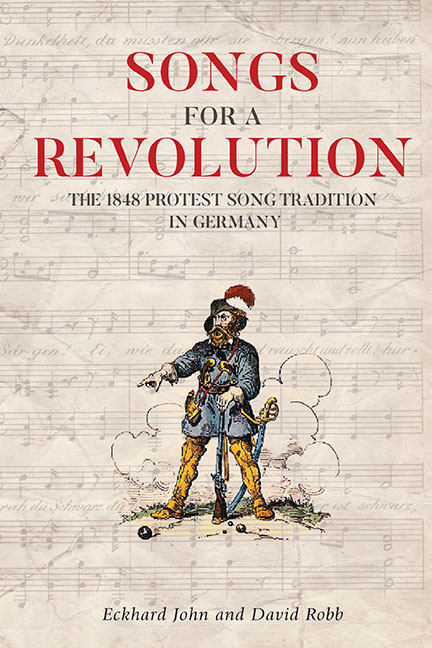Book contents
- Frontmatter
- Contents
- Preface
- Introduction: The Emergence of Political Song 1830–48
- Part I Before 1848: The Vormärz
- Part II 1848–49
- Part III 1848 in Memory
- Conclusion: The Making of Tradition; The Protest Songs of 1848 in the German Folk Revival 303
- Bibliography
- Discography
- Index of Names and Terms
- Index of Song Titles
4 - “Ob Armut euer Los auch sei” (“Trotz alledem”)
Published online by Cambridge University Press: 23 October 2020
- Frontmatter
- Contents
- Preface
- Introduction: The Emergence of Political Song 1830–48
- Part I Before 1848: The Vormärz
- Part II 1848–49
- Part III 1848 in Memory
- Conclusion: The Making of Tradition; The Protest Songs of 1848 in the German Folk Revival 303
- Bibliography
- Discography
- Index of Names and Terms
- Index of Song Titles
Summary
THE POLITICAL SONG “Trotz alledem” was written in 1843 by Ferdinand Freiligrath (1810–76). It was a translation of Robert Burns's “A Man's a Man for a’ that” (also known as “Is There for Honest Poverty”) from 1795. The song circulated in the republican milieu at the time of the 1848 Revolution, the expression “Trotz alledem und alledem” (for a’ that, an’ a’ that) subsequently emerging as an influential slogan in the German workers’ movement. Freiligrath's translation became virtually obsolete in the second half of the twentieth century, when it was superseded in the repertoires of political singers by his 1848 revolutionary adaptation of “Trotz alledem,” “Das war ‘ne heiße Märzenzeit” (It Was a Hot Time in March), particularly during the New Social Movements of the 1970s.
Between 1785 and 1795 Robert Burns (1759–96) wrote four different poems to the traditional song refrain of “For a’ that, an’ a’ that.” “Is There for Honest Poverty,” which became the best-known of these, was first published in August 1795 in the Glasgow Magazine. This poem, Burns's most famous political song, was influenced by the English revolutionary Thomas Paine's text The Rights of Man (1791/92). It lauded the worth of the honest, common man who can see through the façade of wealth and social rank, and who appreciates the merits of an independent mind. In the final verse Burns proclaims the dawning of a new age of universal brotherhood among mankind. It was published in several newspapers at the time, but because of the incendiary nature of such democratic ideas in the wake of the French Revolution, Burns's publisher George Thomson waited altogether ten years (nine years after Burns's death) before he finally published the song in the 1805 edition of his renowned Select Collection of Scottish Airs.
Twenty-eight years later, in November 1843, “Is There for Honest Poverty” was translated into German by Ferdinand Freiligrath. With its title “Trotz alledem” and opening line “Ob Armut euer Loos auch sei” the translation found a wide circulation in Germany, especially in the workers’ movement of the late nineteenth century. An enthusiastic anglophile from his early years, Freiligrath had already translated poems by Walter Scott, Samuel Coleridge, Thomas Moore, and others, and had included thirteen translations of Burns poems (including “My Heart's in the Highlands” and “To a Mouse”) in his first volume, Gedichte, in 1838.
- Type
- Chapter
- Information
- Songs for a RevolutionThe 1848 Protest Song Tradition in Germany, pp. 64 - 76Publisher: Boydell & BrewerPrint publication year: 2020

